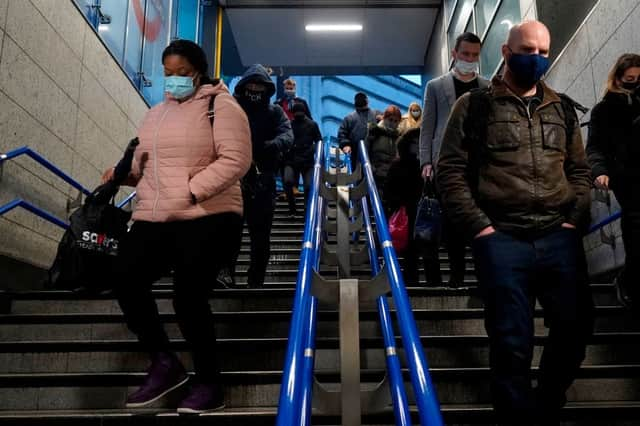Indian Covid variant can ‘spread like wildfire’ among those who haven’t had jab


Health Secretary Matt Hancock has warned that the Indian Covid variant can “spread like wildfire” among those who have not been vaccinated against the virus.
The warning comes as Mr Hancock said there is a “high degree of confidence” that the current vaccines do protect against the variant, amid concerns the strain is 50 per cent more transmissible than other strains.
Calls to get vaccinated
Advertisement
Hide AdAdvertisement
Hide AdThe Health Secretary has urged those who are eligible for vaccination, and have not yet booked an appointment, to come forward for the jab as he warned against the possible impact of the Indian variant.
Mr Hancock said: “Because of the speed of transmission of this one, it can really spread like wildfire amongst the unvaccinated groups - hence we need to get as many people vaccinated as possible, particularly among those who are most vulnerable to ending up in hospital."
The strain is feared to be even more transmissible than the Kent variant, which drove the UK’s deadly second wave of infections over the winter, and is now becoming dominant in some parts of the country.
The majority of cases of the India Covid strain are concentrated in the north-west of England, predominantly in Bolton, and in London.
Advertisement
Hide AdAdvertisement
Hide AdThe variant is also thought to be the reason behind half of coronavirus infections in Bedford, Blackburn with Darwen and South Northamptonshire, although these outbreaks are still small.
Outbreaks have also been identified in two areas of Tyneside and in Newcastle, while there are around 30 cases in parts of Scotland, including Glasgow, with Public Health England saying almost half of all cases are related to travel or contact with a traveller.
The government is deploying thousands of extra Covid tests this weekend in some parts of England in an effort to get the spread of the variant under control, following concerns it could derail plans to ease lockdown restrictions on Monday (17 May).
‘Appropriate’ to ease restrictions
Mr Hancock has insisted it is “appropriate” to continue with the major easing of lockdown restrictions in England on Monday, which includes allowing indoor mixing between households, despite concerns over the Indian variant.
Advertisement
Hide AdAdvertisement
Hide AdSpeaking to Sky’s Sophy Ridge on Sunday, he said if the increase in transmission is lower “there will be almost no impact on our road map and the future number of cases.
He said: “And we just don’t know, so that’s why it’s appropriate to continue down the road map but people need to be cautious and careful.
“And anyway we’re moving the balance more towards people taking personal responsibility and trying to get away from some of the more intrusive ones that we’ve had to have in place.”
The Health Secretary confirmed that a decision on whether the country will be able to proceed to stage four of the road map will be announced on 14 June.
Advertisement
Hide AdAdvertisement
Hide AdCurrently, 21 June is the target date for removing all legal limits on social contact.
He added: “We need to be cautious, we need to be careful, we need to be vigilant and we've said - at each step - we will look at the four tests that we have.
"We assessed those last week for the move we're making as a country tomorrow and our assessment was all four are met.
"The fourth of all those four tests is if a new variant knocks us off course.
Advertisement
Hide AdAdvertisement
Hide Ad"We'll, of course, be assessing that over the weeks to come and we'll make a final decision for step four, which is the biggest step on the roadmap. We'll make that final decision on 14 June.
"We've always said we want this to be cautious, we really want it to be irreversible. New variants are one of the biggest risks to this opening.”